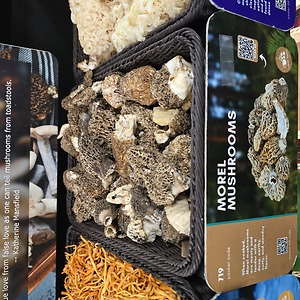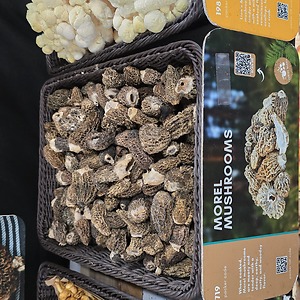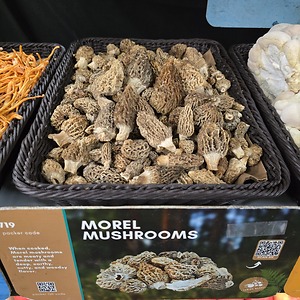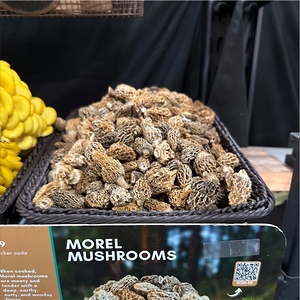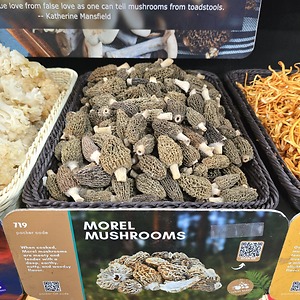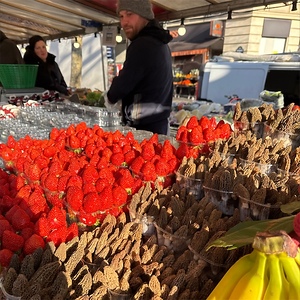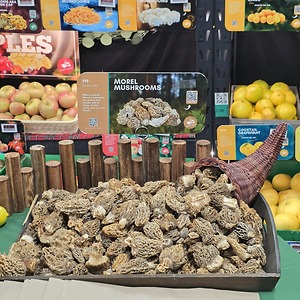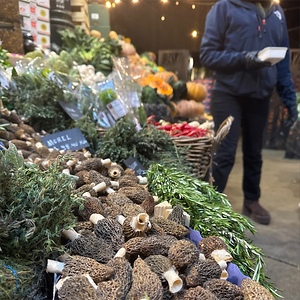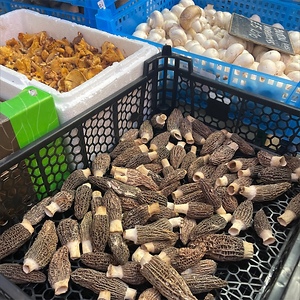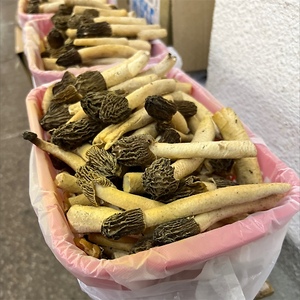


Morel Mushrooms
Estimated Inventory, lb : 22.42
This item was last sold on : 07/22/25
Description/Taste
Morel mushrooms vary in size and appearance depending on the specific variety. They are generally elongated, cone-shaped, round, or egg-shaped, with upright stems. The caps average 2 to 8 centimeters in diameter and 5 to 12 centimeters in length and are found in tan, dark brown, blonde, yellow, grey, white, and black hues. Each cap has a honeycomb-like structure comprised of holes, ridges, cavities, and pits. Morel mushrooms are known for being hollow, and their ridged caps are slightly waxy. Most Morel species will exhibit a paler coloring on the ridges of the caps versus the cavities and pits. The white, cream, or ivory stem is also hollow and averages 2 to 12 centimeters in length. Depending on the species, the stems may have a slight tapering and can sometimes be marked with brown marks and blotches acquired during growth phases. Morel mushrooms are only edible once cooked and should never be eaten raw. The mushrooms are known for their earthy, nutty, and woodsy taste combined with rich, umami-like, savory nuances.
Seasons/Availability
Wild Morel mushrooms are available for a short season in the spring, generally between April and June. Commercially cultivated species are available year-round in select regions worldwide.
Current Facts
Morel mushrooms, botanically a part of the Morchella genus, are a category of multiple species belonging to the Morchellaceae family. The mushrooms typically grow in groups or as solitary fungi and are prized for culinary purposes. Scientists heavily debate the number of species of Morel mushrooms found worldwide, but it is estimated that there could be anywhere from 50 to over 80 species. Morchella esculenta is the most common species, and oftentimes, foragers simplify Morels into three types based on their cap coloring: greys, blacks, and blondes, also called yellow or gold. Morel mushrooms are a seasonal delicacy only found in the wild for a short season each year. Some species are also cultivated for extended availability, but wild types are revered for culinary purposes. It is important to note that Morel mushrooms have similar look-alike species from the Verpa and Gyromitra genera, collectively called False Morels. These species are poisonous and should never be consumed. Care must be taken to correctly identify Morel mushrooms if gathering in the wild. Morel mushrooms are commonly associated with springtime culinary dishes and are favored by chefs for their unusual appearance, rich flavor, meat-like texture, and versatility.
Nutritional Value
Morel mushrooms are a fiber source to aid digestion and vitamins C and D to strengthen the immune system while supporting bone health. The mushrooms also contain minerals like iron, manganese, copper, phosphorus, calcium, zinc, potassium, and magnesium. Iron produces the protein hemoglobin for oxygen transport through the bloodstream, manganese helps develop connective tissues, and copper assists with iron absorption. Phosphorus and calcium support additional bone health, potassium balances fluid levels within the body, and magnesium helps regulate daily nerve functions. Morel mushrooms are also believed to provide antioxidant, anti-inflammatory, and antibacterial properties to protect the body's overall health.
Applications
Morel mushrooms have a savory, earthy, and nutty flavor suited for cooked preparations. The mushrooms should never be consumed raw and must be gently rinsed, brushed, or cleaned by hand to remove dirt and debris. Morel mushrooms are delicate and should be handled with care. The caps and stems are edible and famously sautéed with butter, a simple preparation highlighting their authentic flavor. Sauteed Morel mushrooms can be served with proteins as a savory side dish. Morel mushrooms are also commonly cooked into sauces, especially in wine or cream-based recipes. These sauces can be poured over pasta, grilled meats, or vegetables. Worldwide, Morel mushrooms are popularly cooked into variations of risotto, soups, and stews. They are also pan-fried with other springtime ingredients like asparagus and fiddlehead ferns or cooked and placed over toast as an appetizer. Try adding Morel mushrooms to stir-fries or incorporating the fungi into ragouts and roasts. While less common, Morel mushrooms are cooked, chopped, and folded into spreads, added to empanadas and tacos, or even cooked in tagine dishes. They can also be stuffed with cheese and meat, breaded, and fried for a crispy bite. Morel mushrooms pair well with aromatics like onion, shallots, and garlic, meats like pork, poultry, and beef, and herbs including parsley, chives, and tarragon. Whole, unwashed Morel mushrooms will keep up to one week when stored in a paper bag in the refrigerator. The mushrooms are also dried and stored for extended use.
Ethnic/Cultural Info
In the United States, Morel mushrooms have acquired several peculiar nicknames such as Merkels, Miracles, Molly Moochers, and Dryland Fish. The names Merkel and Miracle appeared from Appalachian folklore. Legend has it that a family survived off eating Morel mushrooms that appeared around their house during a time of starvation. The mushrooms were nicknamed Miracles, and in a strong Appalachian dialect, the name later came to be called Merkels. Molly Moocher is also derived from the Appalachian region, and its origins are heavily debated. Some attribute the name to Molly Pitcher, while others claim Moocher is a term for someone who wanders or strolls. Foraging for Morel mushrooms is time-consuming, and gatherers must move slowly to spot the low-lying fungi. Molly could be a corruption of the name Morel in local dialects of the region. Similarly to mooching, Dryland Fish is a term for Morel hunting. The mushrooms are said to look like small land fish, and foragers “fish” for the fungi by hunting through mushroom-growing regions.
Geography/History
Morel mushrooms are native to a wide geographic range of temperate regions across North America, Europe, and Asia. Many species are found throughout the Northern Hemisphere, and several have been growing naturally since ancient times. Morel mushrooms thrive at the base of trees like Elm, Ash, Poplar, and even Apple, and the fruiting bodies can be found on forest floors, woodlands, pastures, and orchards. Some species of Morel mushrooms also appear in forests that have been burned by wildfires. Morel mushrooms spread throughout the Northern Hemisphere and entered the Southern Hemisphere through natural spore dispersal and the planting of trees. For centuries, Morel mushrooms were only foraged from wild populations, making them a rare seasonal delicacy. Beginning in the late 19th century, efforts were made to cultivate various Morchella species. They were eventually successful in cultivation for commercial markets, and now Morel mushrooms are grown wild and cultivated. Today, Morel mushrooms are found worldwide and are considered a prized culinary ingredient for their unusual appearance and flavor. Fresh Morel mushrooms are primarily found at farmers’ markets and are also sold through wholesalers and select grocers.
Featured Restaurants
Restaurants currently purchasing this product as an ingredient for their menu.
| Hilton La Jolla Torrey Pines | La Jolla CA | 858-450-4581 |
| Pacific Yacht Agents | Los Angeles CA | 808-214-0970 |
| Communion | San Diego CA | 619-606-5568 |
| C 2 C | San Diego CA | 619-972-9345 |
| Chef Drew Mc Partlin | San Diego CA | 619-990-9201 |
| A & M catering | San Diego CA | 206-802-8320 |
| Andrew Spurgin | San Diego CA | 619-277-6020 |
| Wildflour | San Diego CA | 619-289-9240 |
| 31ThirtyOne by Deckman | San Diego CA | 619-495-9814 |
| Tribute Pizza | San Diego CA | 858-220-0030 |
| Juniper & Ivy | San Diego CA | 858-481-3666 |
| Kettner Exchange | San Diego CA | 909-915-9877 |
| Paradisaea Restaurant | La Jolla CA | 732-915-6669 |
| DS Catering Kitchen | Chula Vista CA | 619-703-9321 |
| Lodge at Torrey Pines Main | San Diego CA | 858-453-4420 |
| Leu Leu | Leucadia CA | 619-316-5807 |
| The Lion Share | San Diego CA | 619-564-6924 |
| Golden Door | San Marcos CA | 760-761-4142 |
| Webbcreationfood LLC | San Diego CA | 619-829-9194 |
Recipe Ideas
Recipes that include Morel Mushrooms. One
Podcast



